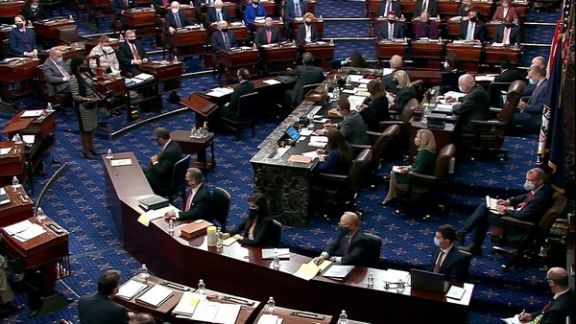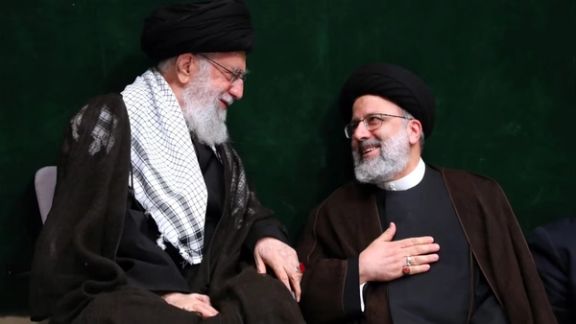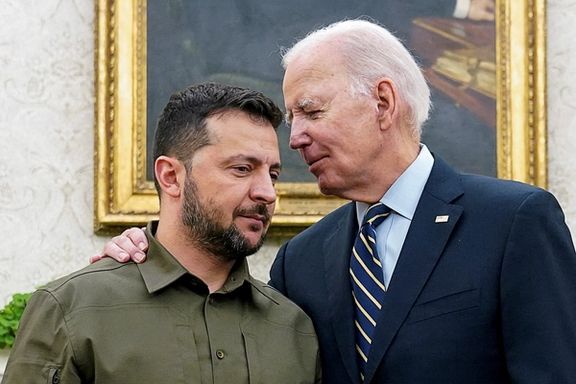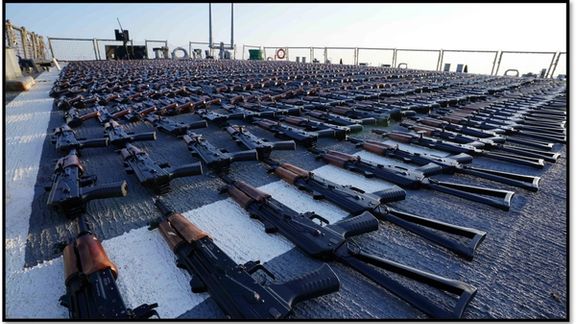France Condemns Iran's Satellite Launch Into Orbit

France has denounced Iran's launch of the Nour-III satellite, declaring it a violation of UN Security Council Resolution 2231, which endorsed the nuclear deal.

France has denounced Iran's launch of the Nour-III satellite, declaring it a violation of UN Security Council Resolution 2231, which endorsed the nuclear deal.
In a statement released on Thursday, the French Ministry for Europe and Foreign Affairs expressed concerns, stating, "Due to the significant technological overlap between space launches and ballistic missile launches, this event directly contributes to Iran's worrisome progress in its ballistic missile program."
Iran announced the successful launch of the satellite, utilizing the Qased Space Launch Vehicle, on September 27th. This launch incorporated technology crucial for the development of a long-range ballistic missile system, coming at a time of escalating tensions between Iran and Western nations.
Paris asserts that this launch follows a series of breaches and repeated violations of Resolution 2231, against the backdrop of nuclear escalation over several years, as reported by the International Atomic Energy Agency. The statement also emphasized "the international community's continued concern regarding Iran's ballistic program."
France called upon Iran to cease its destabilizing ballistic activities and reiterated its commitment to collaborating with allies to prevent Iran from acquiring nuclear weapons.
Last week, the UK also criticized Iran for the satellite launch, stating, "Iran has taken this action despite repeated calls from the UN Security Council to halt its ballistic missile program. Iran's actions further demonstrate its disregard for international restrictions and underscore the grave threat posed by the regime to global security."
This controversy is not new, as the United States has accused Iran of repeatedly violating UN Security Council regulations through its satellite program.
Iran has a history of promptly announcing successful space launches through its state-run television channels while often remaining silent on failed attempts. Over the past decade, Iran has launched several short-lived satellites into orbit and even sent a monkey into space in 2013. However, there have been five consecutive unsuccessful launches in the Simorgh program, which involves satellite-carrying rockets.

Senate Republicans have introduced a legislative measure that would make it extremely difficult for the Biden administration to lift economic sanctions imposed on Iran.
The new legislative effort, called the PUNISH Act, comes in the wake of the controversial ‘prisoner swap’ deal in August for which the administration released $6 billion of Iran’s frozen oil revenues blocked in South Korea and another $2.7 billion from Iraq.
The PUNISH Act takes away the President’s executive authority to lift economic penalties until the administration can show that the Islamic Republic and its affiliated groups in the region have ceased all attempts to assassinate American officials, citizens, and Iranian nationals in the United States.
“President Biden’s strategy of appeasement continues to risk the lives of Americans at home and abroad,” said Sen. Joni Ernst, introducing the Act, “Iran cannot be allowed to continue to attempt to kill US citizens and Iranian dissidents with impunity."

The Biden administration seems to be desperate to find a nuclear deal with Iran and is therefore willing to look away when the regime kills Iranian protesters or sells oil that is supposed to be sanctioned, some critics say.
“My PUNISH Act will put an end to this failed appeasement strategy and ensure Iran feels the maximum consequences of their actions from the United States,” Sen. Ernst said Thursday.
Critics in both Houses have warned the Biden administration that money made available to the regime in Iran would likely be used for more destabilization outside the country and more oppression inside.
Rep. Jim Banks –who introduced the MAHSA Act– highlighted this in a post on his account on X (Twitter), one day after news broke that yet another young girl had been beaten for not covering her hair and was now in critical condition.
“This sort of brutality will continue until Congress holds the Iranian regime accountable,” wrote congressman Banks, “The Senate must take up and pass my MAHSA Act now!
Iranian activists on social media were more direct and more pronounced in their criticism. Dozens bombarded the account of the Office of the Special Envoy for Iran, after it expressed concern and shock at the report.
“What exactly shocked you?!,” wrote one, “the way they’ve used your 6 billion to kill us? You stood by the Islamic Republic in all these crimes.”
https://twitter.com/justchangingun/status/1709706197295653093
The “$6 billion” has become a central part of most criticisms leveled at the Biden administration since its ‘prisoner swap’ deal.
The PUNISH Act seems to be a reaction to that deal. It has to be understood in the context of a broader pushback against Biden’s Iran policy. The administration negotiating with Iran since April 2021 with the declared aim or reviving the 2015 JCPOA nuclear agreement, while relaxing the enforcement of US sanctions. The result has been a surge in Iranian oil exports and a dangerous escalation of it nuclear program.
UN's nuclear watchdog, the International Atomic Energy Agency, estimates that Iran has enough enriched uranium to produce five nuclear bombs, a capability it did not have before Joe Biden was elected President.
Section 8 of the Act reads: “the President may not waive, suspend, reduce, provide relief from, or otherwise limit the application of sanctions imposed pursuant to any covered provision of law.”
The legislation states clearly that sanctions may only be lifted if the State Department certifies that Iran has refrained from supporting or attempting assassination or kidnappings for five continuous years. Lawmakers are also demanding classified briefings on Iran's ongoing assassination plots against US officials and citizens, emphasizing the need to ensure their safety and hold Iran accountable.
Given the Islamic Republic’s persistent pursuit of such actions and ongoing threats against American citizens and dissidents abroad, it is unlikely that the Biden administration can provide such a certification of compliance, assuming that the legislation is enacted into law.

More than 40 member states of the UN Human Rights Council have expressed "serious concern" over the approval of Iran's new hijab bill it branded "gender apartheid".
The law imposes harsher penalties, including longer prison sentences and higher fines, on women who do not adhere to the country's strict Islamic dress code for head coverings and modest attire. Late in September, Iran’s Parliament announced that the bill was approved for a "three-year trial run" following coordination by the judiciary.
During a Wednesday meeting at the 54th Session of the Human Rights Council (UNHRC), the majority of the 47-member group endorsed a statement, initiated by Canada, condemning the Islamic Republic’s intensified measures to enforce hijab through the new bill. The statement was delivered by Canada’s Ambassador to the Council, Leslie E. Norton.
“We join our voices to those of the High Commissioner, Special Procedures, and the Fact-Finding Mission on Iran to express serious concern at the recent adoption of the Chastity and Hijab bill by the Iranian Parliament,” read the statement.
The contentious bill's content was finalized by a committee of approximately 10 lawmakers making the best use of an obscure regulation known as Article 85 of the constitution that enabled the parliament to effectively sideline opposition by restricting discussions on the bill to an internal committee. The only aspect voted upon was the duration for the trial implementation.
Raising alarm over Iran’s plans to deepen punishments for women and girls who do not obey its “draconian compulsory dress code,” the member countries decried the regime for seeking “to force non-complying women into an unprecedented social and economic siege", measures including travel bans, denial of education, health facilities and other public services. Private businesses will also be compelled to refuse services to uncovered women.
UN rights experts branded the new law as “gender apartheid" in September. Rights group Amnesty International said it will impose “draconian penalties” and called on the international community to pressure Iran to revoke the 'despicable' bill.
The signatories also voiced worries about the ever more invasive use of artificial intelligence and facial recognition technology to crack down on women who defy hijab. They say the recently introduced measures worsen the already dire situation for women and girls, “marked by widespread and systematic discrimination in law and practice, in many aspects of their public and private life.”
Referring to the nationwide movement that rallied behind the slogan “Women, Life, Freedom,” the group urged Iranian authorities to heed to the legitimate claims of protesters, and to abide by its obligations under international law, including in matters of women’s rights and gender equality.
“Women and girls of Iran should not be treated as second class citizens and must enjoy the full array of their human rights, free from discrimination, surveillance and fear of retribution,” added the statement.
The move came as an Iranian teenager, Armita Geravand, is in coma following a violent encounter with hijab enforcers at Tehran’s subway. Authorities are handling the situation exactly as they did in the case of Mahsa Amini, with blackouts on CCTV footage, arresting her mother and the journalist who tried to cover the case. Routine denials continue from the highest levels of the regime and massive security is in place around the hospital in which she is in intensive care.
The UNHRC courted global controversy earlier this year when it invited Ali Bahreini, Ambassador of the Islamic Republic of Iran and Permanent Representative to the United Nations, to chair the 2023 UNHRC Social Forum next month. The move gained widespread criticism. The European Parliament said the appointment "is nothing more than a slap in the face given the human rights situation of most Iranians, particularly women, and the repeated executions in the wake of the ongoing protests in the country", in addition to its appalling handling of the pandemic in which it refused to accept Western vaccines at the cost of hundreds of thousands of lives.
The United Nations also came under fire last month for allowing President Ebrahim Raisi to take the stage at the annual General Assembly, giving voice to the regime narrative in which he claimed Iranian women's rights are "unparalleled".

The reinforcement of US naval and aerial assets in the Middle East has effectively discouraged Iranian attacks on commercial ships in the Persian Gulf.
On Wednesday, the commander of US Air Forces Central Command revealed that the decision made in July to deploy fighter jets to the Persian Gulf, alongside a naval destroyer and an amphibious assault group comprising 2,500 US Marines, appears to have made an impact on Iranian officials.
Lieutenant General Alexus Grynkewich, speaking to members of the Defense Writers Group in Washington, stated, "The increased presence of surface vessels that went in ... combined with our airpower has deterred Iran from taking any actions against maritime shipping." He added, "It has had good effects."
In response to Iran's provocations in the Strait of Hormuz, a critical maritime route, the Pentagon dispatched a portion of the Bataan Amphibious Readiness Group, accompanied by a Marine expeditionary unit to the region.
The move followed another announcement by the Pentagon, indicating the deployment of the USS Thomas Hudner, a new Arleigh Burke-class destroyer, and fighter jets, including F-35s and F-16s, to the vicinity of the Strait of Hormuz and the Gulf of Oman for the protection of US interests.
Over the past two years, Iran has been involved in attacks, seizures, or attempted seizures of nearly 20 internationally flagged merchant vessels in the Strait of Hormuz, a vital global shipping passage, as reported by US Central Command, responsible for overseeing operations in the Middle East region.

A new report by the World Bank has put Iran among the worst countries in the world in terms of Worldwide Governance Indicators.
The international financial institution collected data from over 30 think tanks, international organizations, non-governmental organizations, and private firms worldwide to encompass a wide range of perspectives on governance. However, in Iran's secretive regime, even its latest ranking, though low, begs questions as to the accuracy of the data provided, scoring suspiciously in areas such as rule of law.
Governance, defined as the traditions and institutions through which authority in a country is exercised, encompasses aspects such as the process of government selection, monitoring, and replacement, the government's ability to formulate and implement effective policies and the level of respect shown by citizens and the state towards the institutions that oversee economic and social interactions among them.
The Worldwide Governance Indicators (WGI) feature six aggregate governance indicators for over 200 countries and territories from 1996 to 2022: Voice and Accountability, Political Stability and Absence of Violence/Terrorism, Government Effectiveness, Regulatory Quality, Rule of Law, and Control of Corruption. The composite measures of governance are on a standard normal distribution scale, ranging from approximately -2.5 to 2.5, with higher values corresponding to better governance.
In none of the categories did the Islamic Republic regime even come close to zero, which represents the mean or average of the dataset.

The Voice and Accountability index measures the extent to which a country's citizens can participate in selecting their government, as well as the freedom of expression, freedom of association, and a free media. In 2022, Iran scored -1.45, placing the Islamic Republic among the lowest on the list. Since last year's uprising alone, hundreds of journalists have been imprisoned, and Iranian journalists abroad harassed and threatened, including Iran International journalists in London, who were temporarily forced to relocate to Washington.
The Political Stability and Absence of Violence/Terrorism index assesses the likelihood of political instability and/or politically motivated violence, including terrorism. In this category, Iran scored -1.59 in 2022. In addition to its being home to the Islamic Revolutionary Guards Corp, Iran has militia proxies across the region from Syria and Lebanon to Yemen and Iraq.
Having extremely limited freedom of expression and the media, Iran holds one of the world's worst track records for human rights violations, with numerous international bodies and activists calling for the regime's accountability. Tehran does not allow UN rapporteurs to enter and dismisses reports by the United Nations or any other organization seeking to hold it responsible for its heavy-handed crackdown on dissent. Since last year's uprising, thousands of dissidents including stars of sport and entertainment, have been subject to brutal punishments ranging from imprisonment to travel bans and bank account freezes.
The country witnessed its biggest uprising against the ruling power in 2022 when protests erupted nationwide following the death of Mahsa Amini in morality police custody last September. The Iranian government temporarily relaxed its strict enforcement of hijab rules, with more women appearing in public wearing ordinary attire. However, since March, hardliners have intensified their rhetoric and actions to suppress women's defiance of hijab and regain lost ground. According to UN experts, the new measures amount to “gender apartheid.”
Iran scored -0.88 in government effectiveness, which reflects perceptions of the quality of public services, the quality of the civil service and its independence from political pressures, the quality of policy formulation and implementation, and the government's commitment to such policies.
Regulatory quality concerns the government's ability to formulate and implement sound policies and regulations that facilitate and promote private sector development. The Islamic Republic received a score of -1.59 in this category as well, placing it among the bottom 10 countries.
Ironically, in the Rule of Law index, Iran received a score of -1.02, which measures the extent of confidence in societal rules, including contract enforcement, property rights, the police, and the courts, as well as the likelihood of crime and violence. Surprisingly high, this is in spite of brutal crackdowns including mass arrests of journalists and academics, state-sanctioned violence against protesters, and widespread sexual abuse of women in the hands of security forces.
The Control of Corruption index evaluates the extent to which public power is exercised for private gain, and Iran received a score of -1.13. According to Transparency International, which measures Corruption Perceptions Index (CPI), Iran ranked 150 out of 180 countries in 2021, one stop lower than a year earlier.
Critics of President Ebrahim Raisi's administration point to his poor and nepotistic appointments as contributing factors to an ineffective and inefficient government, as well as systemic corruption.
Good governance is not limited to affluent nations. In fact, more than a dozen developing and emerging countries, including Slovenia, Chile, Botswana, Estonia, Uruguay, Czech Republic, Hungary, Latvia, Lithuania, Mauritius, and Costa Rica, achieve governance scores that surpass those of industrialized countries like Italy or Greece.

The US has sent Ukraine more than 1 million rounds of Iranian ammunition that had been seized last year, the US military said on Wednesday.
US Central Command, which is responsible for military operations in the Middle East, said about 1.1 million 7.62 mm rounds were sent to Ukraine. US naval forces for years have been seizing weapons bound for Iran-backed fighters in Yemen, usually transported by fishing vessels.
They were originally seized by US naval forces in December 2022 while being transferred from Iran's Revolutionary Guards to Houthi forces in Yemen “in violation of the United Nations Security Council Resolution 2216.”
“The government obtained ownership of these munitions on July 20, 2023, through the Department of Justice’s civil forfeiture claims against Iran’s Islamic Revolutionary Guard Corps (IRGC),” the Central Command said in its statement.
"The US is committed to working with our allies and partners to counter the flow of Iranian lethal aid in the region by all lawful means including US and UN sanctions and through interdictions," it added.

“Iran’s support for armed groups threatens international and regional security, our forces, diplomatic personnel, and citizens in the region, as well as those of our partners. We will continue to do whatever we can to shed light on and stop Iran’s destabilizing activities.”
Last year, Britain's Royal Navy said one of its warships had seized Iranian weapons, including surface-to-air-missiles and engines for cruise missiles, from smugglers in international waters south of Iran.
Yemen's Houthi movement has battled a Saudi-led coalition since 2015 in a conflict that has killed hundreds of thousands and left 80% of the population dependent on aid.
(With reporting by Reuters)